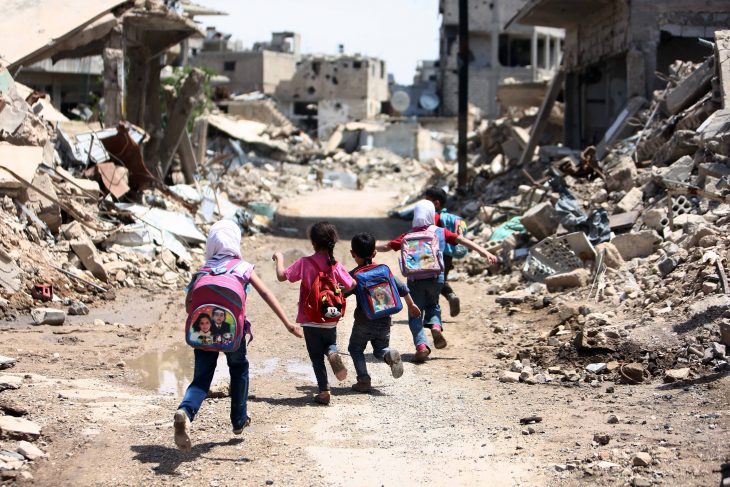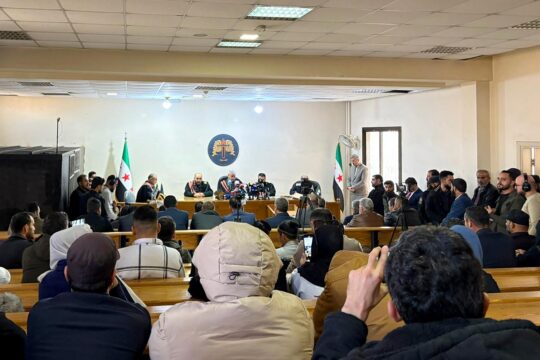Germany will Tuesday start its first war crimes trial over atrocities in Syria, as a mass refugee influx brings not only witnesses and victims but also suspects into the country.
Aria L., a 21-year-old German national and suspected jihadist, posted on Facebook photos of himself posing next to two decapitated heads in Syria -- and his case is not the only one from the war-torn country to occupy German justice.
"Ten investigations linked to Syria or Iraq are currently being examined by the federal prosecutor, on top of more than 30 cases against former jihadists over their membership in a terrorist group," said a spokesman for the prosecutor's office.
Among other key war crimes suspects are Ibrahim Al F., a 41-year-old Syrian and the alleged leader of an Islamist rebel group known for kidnapping and torturing civilians in Aleppo.
Another suspect is Suliman A.S., a 24-year-old Syrian suspected of having kidnapped a UN soldier in 2013.
Such investigations have gained momentum particularly as 1.1 million asylum seekers arrived in Germany last year, about 40 percent of whom fled the wars in Syria and Iraq.
Authorities dealing with their asylum requests have picked up and sent 25 to 30 tips every day to prosecutors, as Germany since 2013 requires applicants to complete a form asking if they have witnessed war crimes or could name perpetrators of violations.
"The refugee influx has provided new opportunities for prosecutors to collect specific information," said Geraldine Mattioli, expert on international justice at Human Rights Watch.
- Mixed success -
Germany is no stranger to trying war crimes committed abroad, although past attempts have been met with mixed success.
In 1993, pushed by an inflow of refugees fleeing the war in Yugoslavia, Germany formed a special police unit dedicated to investigating war crimes committed in the Balkans.
Other European countries took similar action, with one of the most active investigations carried out by Dutch police.
German prosecutors eventually examined 127 cases and heard 4,500 witnesses. But the Herculean effort led to only four trials, including a genocide conviction.
Undeterred, the prosecution service sought ways to refine their procedure, becoming more sophisticated in tackling cases involving massacres in Africa's Great Lakes region.
There, the judiciary dispatched its investigators to collect evidence on the ground and sought to offer better protection for witnesses.
The painstaking task led to the convictions of two Rwandan rebel leaders for masterminding massacres in eastern Democratic Republic of Congo from their homes in Germany.
Yet during the costly trial lasting four and a half years, some charges had to be dropped due to lack of evidence and witnesses.
There are multiple geographical, cultural and linguistic challenges prosecutors face as they seek to build a case, jurist Juergen Schurr wrote in a report for the association Redress.
"The mass crimes affect, typically, a large number of suspects, traumatised and often marginalised victims and witnesses with a foreign language and culture," he wrote.
- 'Start somewhere' -
Investigators dealing with Syrian cases face the additional challenge of access. With the war still raging, they are unable to travel there to gather evidence.
And while propaganda images posted by jihadist fighters on social networks offer a glimpse of the atrocities, it is difficult to authenticate the photos or their provenance.
But with the mass arrivals of refugees, Germany is taking a pro-active stance by collecting information bit by bit, and filing it away country by country, rather than wait for specific accusations before taking action.
The hope is that each minute detail being collected could one day help build a broader picture or point to a specific trend.
One shortcoming is that the process rarely targets high-ranking officials of President Bashar al-Assad's regime, as comparatively few Syrian soldiers have become refugees arriving in Europe, Mattioli said.
At the same time, Mattioli said about the search for justice, "it has to start somewhere".
After all, the proceedings carried out by Germany, the Netherlands, France, Sweden and Finland, are, for the moment, the only ones that seek to curb impunity in Syria.
cfe/hmn/fz/ser






